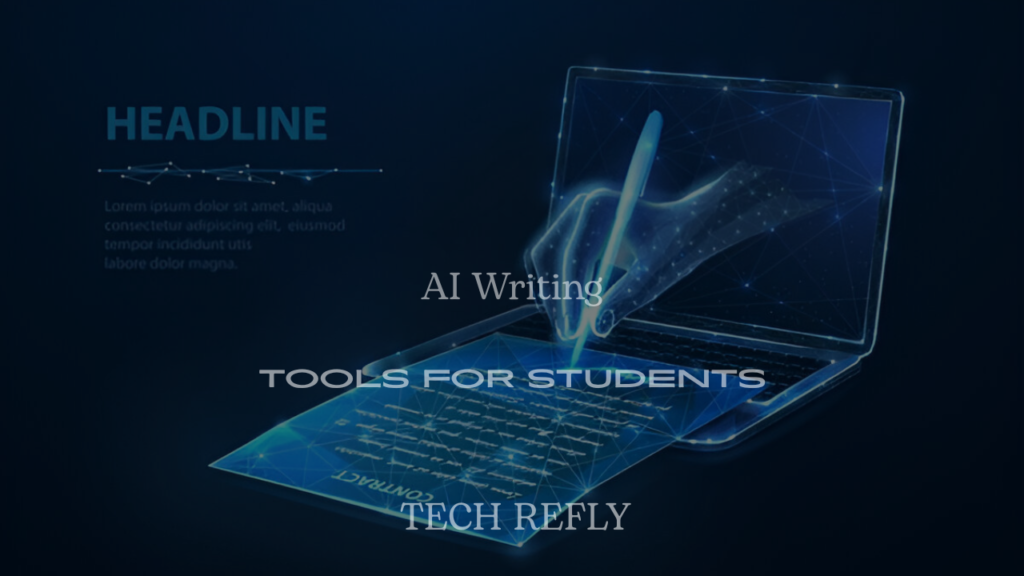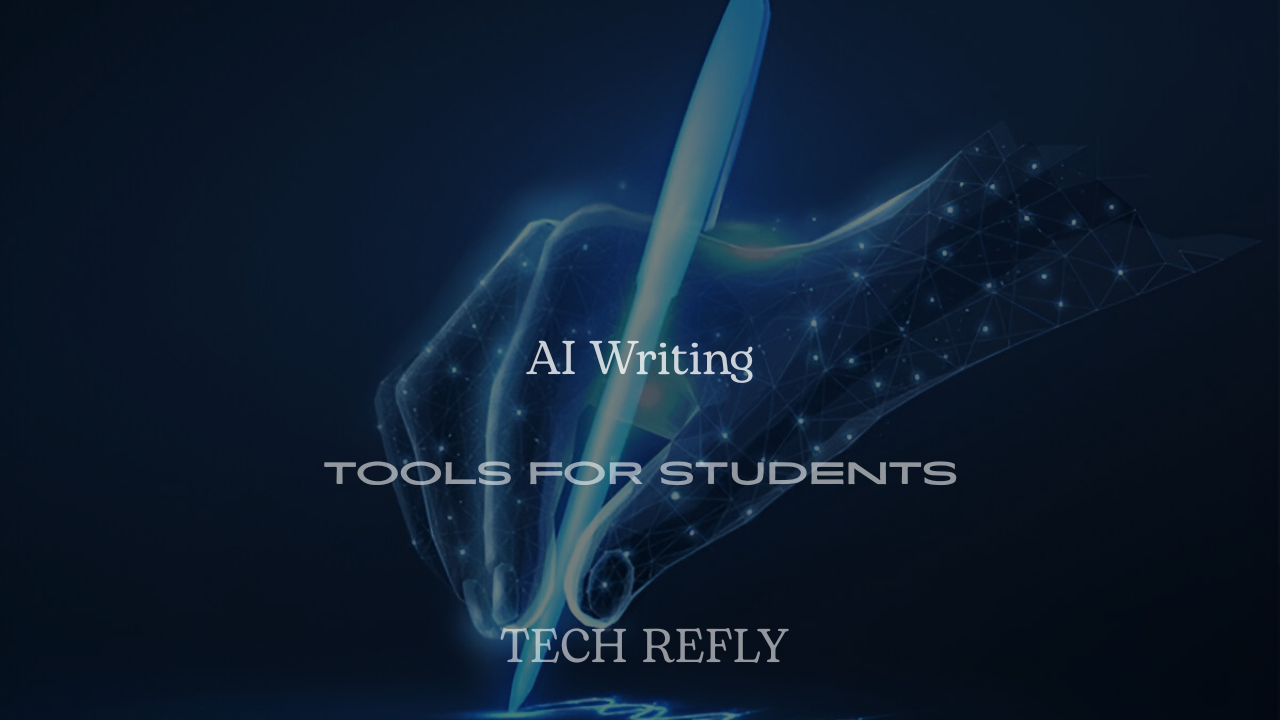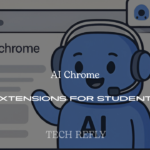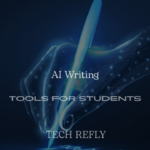In 2025, students have more opportunities than ever to leverage AI writing tools for academic success. These platforms help with everything from grammar correction and paraphrasing to full essay generation and research summaries. The best part? They save hours of work, reduce stress, and improve the quality of assignments. Whether you’re in high school or pursuing a master’s degree, these top AI writing tools for students can help you write smarter, faster, and more effectively.

Grammarly
Grammarly is one of the most widely used AI-powered writing assistants, perfect for academic assignments, emails, and research papers.
Key Features:
- Real-time grammar and punctuation correction
- Style and tone suggestions
- Built-in plagiarism checker
- Works across browsers, Word, and Google Docs
Pros:
- Highly accurate grammar detection
- Easy integration with multiple platforms
- Great for academic and casual writing
Cons:
- Premium version needed for advanced checks
- Limited offline functionality
QuillBot
QuillBot is famous for its AI-powered paraphrasing, summarizing, and citation generation.
Key Features:
- Multiple writing modes (Fluency, Formal, Creative)
- Summarizer for quick content digestion
- Grammar checker
- Citation generator
Pros:
- Great for rewording academic text
- Free version available with core features
- Fast and accurate results
Cons:
- Character limits on the free plan
- Premium needed for advanced modes
Jasper AI
Jasper AI is an advanced AI writing platform ideal for generating structured essays and creative assignments.
Key Features:
- 50+ writing templates
- Adjustable tone and style
- Brainstorming and content expansion tools
- SEO integration with Surfer SEO
Pros:
- Produces high-quality, human-like text
- Excellent for long-form academic writing
- Great for both essays and creative projects
Cons:
- Higher cost than many student tools
- Slight learning curve for beginners
ProWritingAid
ProWritingAid is perfect for students who want detailed editing reports.
Key Features:
- Grammar and style improvement suggestions
- Readability scoring
- Overused word detection
- Integration with Word, Google Docs, and Scrivener
Pros:
- In-depth writing analysis
- Helps improve overall writing style
- Affordable yearly plans
Cons:
- Slower than Grammarly for real-time checks
- Interface can feel complex for new users
ChatGPT
ChatGPT is a versatile AI that can help with essays, brainstorming, and research summaries.
Key Features:
- Generates content in multiple formats
- Rephrases and explains concepts
- Interactive Q&A
- Works on web and mobile
Pros:
- Extremely versatile
- Fast response generation
- Great for brainstorming and studying
Cons:
- Requires human editing for accuracy
- Free version has usage limits
Copy.ai
Copy.ai focuses on creative and academic content creation.
Key Features:
- 90+ templates for essays, blogs, and projects
- Brainstorming feature for ideas
- Multiple tone settings
Pros:
- Beginner-friendly interface
- Works for both academic and marketing tasks
- Offers a free plan
Cons:
- Some templates feel repetitive
- Limited offline use
Writesonic
Writesonic offers both short-form and long-form AI writing for academic purposes.
Key Features:
- Essay and report generation
- Paraphrasing and summarizing tools
- Multilingual support
Pros:
- Affordable student-friendly pricing
- Quality writing output
- Includes AI chatbot Chatsonic
Cons:
- Occasional factual errors
- Interface can feel crowded
Wordtune
Wordtune focuses on rewriting and enhancing clarity.
Key Features:
- Sentence rephrasing in multiple tones
- Works within Google Docs
- Multilingual editing
Pros:
- Improves sentence flow instantly
- Very easy to use
- Great for academic editing
Cons:
- Limited features in free version
- No plagiarism checker
Rytr
Rytr is an affordable AI writing assistant suitable for various student needs.
Key Features:
- Content generation in 30+ languages
- Tone customization
- Plagiarism checker
Pros:
- Budget-friendly pricing
- Supports many formats
- Quick output generation
Cons:
- Limited advanced features
- Output quality can vary
Hemingway Editor
Hemingway Editor simplifies and clarifies writing for better readability.
Key Features:
- Highlights complex sentences
- Grades text by readability level
- Works offline and online
Pros:
- Excellent for improving clarity
- One-time purchase for desktop app
- Easy to use
Cons:
- No grammar checker
- Lacks advanced AI features
Scalenut
Scalenut is great for research-based academic content.
Key Features:
- AI research assistant
- Long-form writing mode
- Content structuring tools
Pros:
- Great for data-backed assignments
- Organizes large writing projects
- Strong SEO capabilities
Cons:
- More business-focused features
- Learning curve for new users
Smodin
Smodin is a multi-tool AI platform for students.
Key Features:
- Plagiarism checker
- Multilingual text generation
- Essay rewriter and citation generator
Pros:
- Offers free version
- Versatile academic tools
- Multilingual support
Cons:
- Free plan has strict limits
- Output quality can vary
Hypotenuse AI
Hypotenuse AI specializes in summarizing and generating research-based content.
Key Features:
- AI summarizer for study materials
- Adjustable tone
- Multiple export options
Pros:
- Easy for beginners
- Fast and accurate summaries
- Great for academic writing
Cons:
- Limited free access
- Best for short-form content
INK Editor
INK combines AI writing with SEO optimization.
Key Features:
- AI-assisted grammar and style checks
- SEO score for better online visibility
- Distraction-free mode
Pros:
- Good for students with blogs
- Helps improve online presence
- Works offline
Cons:
- SEO focus not always relevant to academics
- Limited free plan
Frase.io
Frase.io excels in research-heavy writing.
Key Features:
- AI fact gathering
- Content briefs and outlines
- Keyword optimization
Pros:
- Excellent for academic research
- Organizes ideas efficiently
- Integrates with writing tools
Cons:
- Subscription cost is higher
- Requires internet for full features
Sudowrite
Sudowrite is perfect for creative assignments.
Key Features:
- Idea and plot expansion
- Creative text suggestions
- Descriptive writing improvements
Pros:
- Boosts creativity instantly
- Fun, interactive interface
- Great for literature students
Cons:
- Less suitable for technical essays
- Requires premium for most features
Paraphraser.io
Paraphraser.io is a simple but effective rewriting tool.
Key Features:
- Multi-language paraphrasing
- Grammar and plagiarism checks
- Quick rewording
Pros:
- Easy to use
- Free access available
- Fast results
Cons:
- Limited features compared to full AI suites
- Occasional awkward phrasing
Chatsonic
Chatsonic is like ChatGPT but with real-time search capabilities.
Key Features:
- Context-aware chatbot
- Essay and summary creation
- Voice command support
Pros:
- Can pull up-to-date facts
- User-friendly
- Good for quick research
Cons:
- Subscription needed for full features
- Occasional irrelevant outputs
Essaybot
Essaybot is built specifically for student essay writing.
Key Features:
- Topic-based essay generation
- Citation suggestions
- Rewriting and editing tools
Pros:
- Fast essay drafting
- Beginner-friendly
- Integrated plagiarism tools
Cons:
- Limited customization options
- Needs editing for coherence
Comparison Table of AI Writing Tools for Students
| Tool | Best For | Pros | Cons |
| Grammarly | Grammar & style | Accurate, easy integration | Premium needed for full features |
| QuillBot | Paraphrasing & citations | Free plan, accurate rewording | Limits on free version |
| Jasper AI | Long-form & creative | High quality, SEO integration | Expensive |
| ProWritingAid | In-depth editing | Detailed reports, affordable | Slower than Grammarly |
| ChatGPT | Versatile writing | Fast, multipurpose | Requires fact-checking |
| Copy.ai | Creative projects | Easy to use, free plan | Repetitive outputs |
| Writesonic | Essays & reports | Affordable, multilingual | Occasional errors |
| Wordtune | Sentence clarity | Instant improvements | No plagiarism check |
| Rytr | Budget writing | Cheap, supports 30+ languages | Limited advanced features |
| Hemingway Editor | Readability | Improves clarity | No grammar check |
| Scalenut | Research writing | Data-backed, organized | Business-oriented |
| Smodin | Academic multi-tool | Free plan, multilingual | Quality varies |
| Hypotenuse AI | Summarizing | Accurate summaries | Limited free plan |
| INK Editor | SEO + writing | Offline use, SEO score | SEO not always needed |
| Frase.io | Research-heavy | Excellent for academics | Expensive |
| Sudowrite | Creative writing | Fun, boosts creativity | Not for technical work |
| Paraphraser.io | Quick rewriting | Easy, free access | Awkward phrasing |
| Chatsonic | Real-time facts | Up-to-date info | Needs subscription |
| Essaybot | Essay drafting | Beginner-friendly | Needs editing |
Why These AI Writing Tools Are the Best for Students
The AI writing tools in this list stand out because they’re designed to meet the unique challenges students face. From tight deadlines and complex research papers to grammar perfection and plagiarism concerns, these tools provide targeted solutions. Most importantly, they:
- Save time by automating parts of the writing process
- Help improve academic writing quality and structure
- Offer plagiarism detection to maintain originality
- Provide flexibility across multiple subjects and formats
By integrating these into your workflow, you can spend less time worrying about mechanics and more time on critical thinking and analysis.
How to Use AI Writing Tools Effectively as a Student
Using AI writing tools doesn’t mean replacing your own ideas it’s about enhancing your productivity and accuracy.
- Start with a clear brief – Feed the tool your topic, guidelines, and preferred style.
- Use AI for brainstorming – Generate ideas, outlines, or bullet points before writing.
- Write the first draft yourself – Then use AI to refine grammar, style, and clarity.
- Paraphrase carefully – Avoid over-relying on paraphrasing; maintain your own voice.
- Always fact-check – AI can make errors, so verify information from credible sources.
- Cite sources properly – Use built-in citation tools or manual referencing to avoid plagiarism.
Tips to Create Your Own Academic Content with AI Assistance
Even with AI, your creativity and academic integrity matter most.
- Mix AI and personal research – AI can’t replace first-hand reading and note-taking.
- Customize tone for each assignment – Formal for research, conversational for presentations.
- Leverage multiple tools together – Example: Grammarly for grammar + QuillBot for paraphrasing.
- Review before submission – Run final checks for coherence and originality.
Additional Benefits of Using AI Writing Tools for Students
- Time efficiency – Cut writing and editing time by up to 50%.
- Learning aid – Understand grammar and sentence structure through AI suggestions.
- Confidence boost – Submit polished work without last-minute stress.
- Language support – Many tools support multiple languages for ESL students.
Conclusion
In 2025, the best way to excel academically isn’t to work harder it’s to work smarter. These top 15 AI writing tools for students give you the advantage of speed, accuracy, and professional-grade output. Whether you need help structuring a research paper, refining an essay, or brainstorming project ideas, there’s an AI tool on this list for you.
If you’re serious about improving your grades and making your writing process stress-free, try combining 2–3 tools for maximum efficiency for example, Grammarly + QuillBot + ChatGPT.
📌 Pro tip: Bookmark this guide so you always have the best academic writing tools at your fingertips.
FAQs
Q1: Are AI writing tools allowed in schools and universities?
It depends on your institution’s policy. Many allow AI for grammar checks and brainstorming but prohibit fully AI-written submissions. Always check your school’s academic integrity guidelines.
Q2: Which AI writing tool is best for essays?
For essays, a combination of Jasper AI for content creation and Grammarly for editing works best. If you need paraphrasing, QuillBot is an excellent addition.
Q3: Can AI writing tools check for plagiarism?
Yes. Tools like Grammarly, QuillBot, and Smodin have built-in plagiarism checkers to ensure originality.
Q4: Are free AI writing tools as good as paid ones?
Free tools are great for basic tasks, but premium plans usually offer more advanced features, higher accuracy, and fewer limitations.
Q5: Can AI help improve my academic writing style?
Absolutely. Tools like ProWritingAid and Wordtune offer detailed style suggestions that help you write in a clear, academic tone.
Q6: Do AI tools work for non-English assignments?
Yes. Many tools, such as Rytr, Writesonic, and Smodin, support multiple languages, making them useful for bilingual or multilingual students.
Q7: Which AI tool is best for fast research summaries?
Hypotenuse AI and Frase.io are excellent for summarizing large amounts of information quickly.










